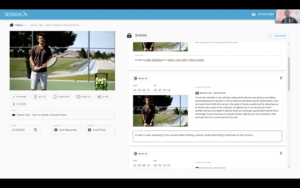Categories
Archives
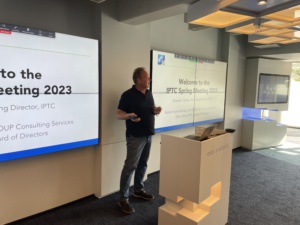
We have just finished the IPTC Spring Meeting in Tallinn, Estonia. Our first face-to-face IPTC Member Meeting since 2019, those who could attend in person were very happy to be back together, enabling collaboration, knowledge sharing and building bonds across organisations in the media industry.
We were also joined by over 50 online attendees from IPTC member organisations, who braved sometimes difficult timezone differences to view many of the sessions in real time and participate in discussions. Other IPTC members who weren’t able to be there either physically or virtually will be able to watch recordings of the sessions soon.
Themes this time obviously included Generative AI, but also fact-checking and provenance, social media embedding and social stories,
Highlights of the Monday included a special briefing about digital citizenship and digital governance at the e-Estonia Briefing Centre, where members heard from an Estonian government representative who described Estonia’s electronic tax, medicine, administration and even e-voting system, all powered by the cryptographically-protected digital ID card and the X-Road system of interconnecting all of e-Estonia’s services, across both the private and public sector.
Also on the Monday we heard from Gerd Kamp (dpa) who explained how dpa are using Web Components technology to embed social media into their articles in a way that’s much easier for their customers to process. We also heard Working Group presentations and new standard proposals from the NewsML-G2 Working Group and the News in JSON Working Group, whose lead Johan Lindgren (TT) handed over the reins to Ian Young (PA Media / Alamy) who promises to be a fine leader of the group in the future. We say many thanks to Johan for all his contributions to IPTC over the past 25 years!
We also heard from Evi Varsou (ATC) who demonstrated some of ATC’s tools for fighting fake news and misinformation, used by some of the world’s top news organisations.
Day 2 saw Dave Compton (Refinitiv, an LSE Group Company) describe some of their work on handling augmenting news content in real time with analytics information. Then we heard invited speaker Maria Amelie (Factiverse) talk about her troubles with the Norwegian authorities, being deported, and eventually getting Norwegian law changed to support refugees like herself. She now runs the startup Factiverse which is looking at using AI to help promote fact checks as fast as possible, via their site Factisearch (among other projects).
After a discussion on rights and RightsML, we heard from Estonian startup Texta (who provide several tools for media organisations, including an automated comment feed moderator that works in many languages), and German startup Storifyme.com who have created a tool that lets media companies quickly and easily create social posts from news stories – still very relevant even as Google AMP is being wound down.
Tuesday was rounded off by Jennifer Parrucci (The New York Times) presenting the NewsCodes Working Group‘s update, and Paul Kelly (Individual Member) giving an update on the huge amount of work on IPTC Sport Schema from the Sports Content Working Group.
On Wednesday, after an EGM voting on an update to the Articles of Association, we heard from Charlie Halford (BBC) on Project Origin and C2PA, and Sebastian Posth of International Standard Content Code.
We also voted in updates to NewsML-G2 and ninjs, which will be announced here soon.
We’re already looking forward to the Autuymn Meeting, held in October online, and Spring Meeting 2024, hopefully in New York City!
We had a great Photo Metadata Conference last Thursday. Thanks to those who attended. For those who didn’t, or those who would like to go over some detail again, here we publish full recordings of all sessions.
First up, Brendan Quinn, IPTC Managing Director introduced the day and gave an overview of what was to come:
Next was a great panel on adoption of the accessibility properties added in the 2021.1 update to the IPTC Photo Metadata Standard. We are very happy to share that the fields are now supported in many popular photo creating and editing tools, with more to come:
Next was David Riecks and Michael Steidl, co-leads of the IPTC Photo Metadata Working Group, presenting the work done by the Working Group since the last Photo Metadata Conference:
Then came a session on real-world implementations of the C2PA specification for content authenticity, including presentations from Microsoft, CBC / Radio Canada, the BBC and Adobe / Content Authenticity Initiative:
The last session was a panel discussion on Metadata for AI Images, looking at questions around the ethics of using copyrighted content to train a machine learning engine to generate AI images, and how the IPTC Photo Metadata Standard could be extended to support metadata appropriate for AI-generated images:
We had a great session and a packed conference! We look forward to seeing everyone again at next year’s event.
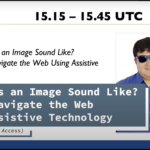
The IPTC Photo Metadata Working Group is proud to announce the IPTC Photo Metadata Conference 2022. The event will be held online on Thursday November 10th from 15.00 – 18.00 UTC.
This year the theme is Photo Metadata in the Real World. After introducing two new developments last year: the IPTC Accessibility properties and the C2PA specification for embedding provenance data in photo and video content – we re-visit both technologies to see how they are being adopted by software systems, publishers and broadcasters around the world.
The 3-hour meeting will host four sessions:
- Adoption of the IPTC Accessibility Properties – we hear from vendors and content creators on how they are progressing in implementing the new properties to support accessibility
- Software Supporting the IPTC Photo Metadata Standard – showcasing an update to IPTC’s directory of software supporting the IPTC Photo Metadata Standard, including field-by-field reference tables letting users compare software implementations
- Use of C2PA in real workflows – showcasing early work on implementing the C2PA specification in media organisations
- Artificial Intelligence and metadata – looking at the questions around copyright and synthetic media: for example, when generative AI uses thousands of potentially copyrighted images to train machine learning models, who owns the resulting images?
We look forward to welcoming all interested parties to the conference – no IPTC membership is needed to attend. The event will be held as a Zoom webinar.
Please see more information and the Zoom registration link on the event page.
See you there on the November 10th!
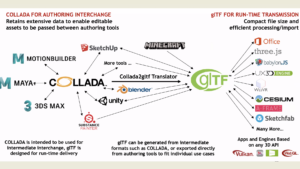
Last week the IPTC held its Autumn Meeting 2022, with over 70 attendees from over 20 countries attending the three-day online event.
Discussions were as wide-ranging as ever. Highlights were a guest presentation on how media organisations can prepare for the Metaverse from startup advisor and previous member of the Microsoft HoloLens team, Toby Allen; intense discussions from members about making our work in machine-readable rights and RightsML simpler and more accessible and to bridge the gap between our simple, lightweight JSON news standard ninjs and our richly structured full-featured XML-based standard NewsML-G2.
We also heard about many other topics:
- Meinolf Ellers at IPTC member dpa spoke about the DRIVE initiative, which follows on from the C-POP project that IPTC advised on in 2019 and 2020. DRIVE allows consortium members to share data about content usage to drive subscriptions and engagement, and to find under-represented areas in their news output to meet audience needs.
- We heard about representing social media content in NewsML-G2: Dave Compton of Refinitiv spoke about their work encoding content from Twitter and other social networks in NewsML-G2 format for re-use, enhancement and syndication.
- Will Kreth, previously CEO of EIDR, spoke about the HAND project which aims to create a unique identifier for media and sports talent
- Fredrik Lundberg from IPTC member iMatrics and guest presenter Jens Pehrson from GOTA Media spoke about a new tool they have developed that allows publishers to track the gender balance in their news content
- Johan Lindgren from IPTC member TT (the Swedish national news agency) spoke about their recent project to develop a classification and entity extraction engine for their news content, based on IPTC Media Topics taxonomy
- We heard from Audren Layeux of CARSA who spoke about the European Media Data Space project, an EU initiative
- Ben Colman, CEO of RealityDefender spoke (direct from TechCrunch Disrupt in San Francisco!) about their deepfake detection technology, used by social media networks, financial institutions and media organisations to detect manipulated images and videos.
- IPTC MD Brendan Quinn spoke about IPTC’s ongoing work with C2PA and Project Origin, including forthcoming additions to C2PA to include video metadata.
In addition, we heard updates from all IPTC Working Groups: Dave Compton introduced NewsML-G2 2.31; Paul Kelly spoke about some new developments in the RDF-based sports data model which will be announced soon; Pam Fisher described the work of the Video Metadata Working Group and the changes coming in Video Metadata Hub v1.4; David Riecks and Michael Steidl spoke about Photo Metadata Standard 2022.1 and the ongoing work of the Photo Metadata Working Group;
The Standards Committee voted in new standard versions: NewsML-G2 v2.31, Video Metadata Hub v1.4, and Photo Metadata Standard 2022.1. These will be released and publicised over the coming weeks.
The IPTC Annual General Meeting 2022 saw Johan Lindgren step down from the Board of Directors after 6 years of service. Thanks very much for all your help, Johan!
We are very happy to welcome a new Board member: Heather Edwards of Associated Press.
Thanks very much to everyone who attended and spoke. You contributed to making it a great event for all!
As usual, full recordings of all sessions are available to IPTC members on the members-only event page.
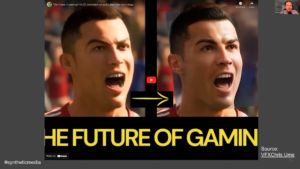
Where else can you hear about the difficulties of examining photo metadata in NFTs, see a lifelike image of a human being generated from pure data before your eyes, see how Wikidata can be used to take semantic fingerprints of news articles, and discover that an hour is nowhere near long enough to discuss simplifying machine-readable rights? Nowhere but the IPTC Meeting, of course! And this year’s Spring Meeting was the venue for all of this and much more.
We held the meeting virtually from Monday May 16 to Wednesday May 18th, and attending were over 70 people from at least 45 organisations across more than 20 countries.
Along with our usual Working Group updates and committee meetings, we invited speakers from several fascinating startups, services and projects at member companies. Here’s a quick summary of their sessions:
- We heard from Kairntech who are working on a classification system based on extracting entities from news stories and building a “semantic fingerprint” which can be used for cross-language classification, search and content enhancement
- The New York Times’ R&D Lab presented PaperTrail, a project to enhance the quality of the Times’ print archive through the use of machine learning to improve on basic OCR techniques (they’re looking for collaborators, more info coming soon!)
- Bria.ai showed us how an API can be used to enhance and create images and videos through the use of a custom GAN model trained in a “responsible AI” method
- Margaret Warren talked us through her efforts in creating and selling an NFT, looking at the process view the perspective of a photo metadata expert
- Consultant and author Henrik de Gyor talked us through the latest in synthetic media, which will be helpful in helping us to finalise our Digital Source Type vocabulary for synthetic media
- Laurent Le Meur from EDRLab presented his project’s recommendation on a Text and Data Mining Reservation Protocol, which can be used by publishers to restrict the rights of data miners in scraping any content for the purpose of analysis or building a model
- We heard from Dominic Young of Axate on his approach to offer pay-as-you-go payment options on paywalled news sites based on a simple pre-paid wallet mechanism.
We also had many announcements and discussions around IPTC standards, many of which we will be revealing in the coming months. One notable update is that the Standards Committee approved ninjs version 1.4 which we will release soon.
Thanks to all the IPTC members, Working Group leads, committee members and guests who made this member meeting one to remember.
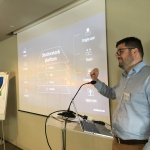
With less than two weeks to go, we are pleased to announce the full agenda for the IPTC Spring Meeting 2022.
The IPTC Spring Meeting 2022 will be held virtually from Monday May 16th to Wednesday May 18th, from 1300 – 1800 UTC each day.
IPTC member representatives can view the full agenda and register at https://iptc.org/moz/events/spring-meeting-2022/
Highlights of the meeting include:
- Updates from all IPTC Working Groups, including Photo Metadata, Video Metadata, NewsCodes, Sports Content, NewsML-G2 and News in JSON
- Updates from the IPTC PR Committee and the IPTC Standards Committee, including votes on proposed new versions of IPTC standards
- Invited presentations from:
- United Robots, presenting their “robot journalism” system built for media companies
- Axate‘s micropayments system for publishers
- Kairntech presenting their content classification system used by Agence France-Presse among others
- Bria.ai‘s image generation and manipulation API backed with cutting-edge artificial intelligence
- Consultant Henrik de Gyor speaking on the latest developments in synthetic media
- Laurent Le Meur from EDRLab discussing the W3C Text and Data Mining Community Group’s recommendation for a Text and Data Mining Reservation Protocol
- Member presentations:
- Recently-joined IPTC members will have a chance to introduce themselves and their organisations to the IPTC membership
- The New York Times presenting their “Papertrail” system used to target advertising based on content metadata
- Margaret Warren from ImageSnippets discussing what she learned when creating NFTs from her artwork
- Member discussions:
- IPTC members will be discussing how we might be able to simplify rights management with a cut-down basic set of rights assertions, possibly creating a simpler alternative to RightsML
- IPTC members will also be discussing the News Architecture and how we can better utilise the key data model that underlies both NewsML-G2 and ninjs
- and more!
Attendance to the 2022 IPTC Spring Meeting is free for all delegates and member experts from IPTC member organisations.
Invited speakers are welcome to attend the day on which they are speaking.
We had a great IPTC Photo Metadata Conference last week, focussing on accessibility, interoperability and authenticity.
Videos of all sessions are embedded in this post. Videos are also available from the event page. All videos have subtitles available – just click the “CC” button in the YouTube toolbar at the bottom of each video.
We started off with an introduction from IPTC Managing Director, Brendan Quinn:
Accessibility and “Born Accessible Content”
We then went into the first session, where David Riecks, co-lead of the IPTC Photo Metadata Working Group, introduced the new accessibility properties in the IPTC Photo Metadata Standard:
Next up was Sam Joehl of Level Access, who gave a fascinating presentation showing how a screen-reader application deals with images on the web, showcasing the need for good alternative text and image descriptions:
Next was a panel moderated by Caroline Desrosiers of Scribely, entitled Making Images Accessible Across Industries: How Does it Work and What’s Next? Speakers included James Tiller, Cailin Meyer and Rebecca Snyder of the Smithsonian Institution, Rachel Comerford from Macmillan Learning and Jon Sasala from Morey Creative Studios. The subject matter ranged from Smithsonian’s image description guidelines for scientific research to Macmillan’s “Born Accessible Content” initiative to the problems with “overlay” software that attempts to write alt text automatically. View the session here:
The next panel was moderated by David Riecks, and focused on “Image Accessibility Behind the Scenes: Metadata, DAMs, and Workflows.” Speakers were Andrew Kirkpatrick, Director of Accessibility at Adobe, Margaret Warren, founder of ImageSnippets, and Janos Farkas, CEO of CLink Media. This session looked at the implementor’s view and covered issues around user interfaces, ensuring metadata stays with images throughout their lifecycles, and of course asked when the new accessibility properties would be available in Adobe products!
Interoperability with Michael Steidl
Next up we moved on from accessibility to the second theme of the day, Interoperability. Michael Steidl, the other co-lead of the IPTC Photo Metadata Working Group, demonstrated IPTC’s Photo Metadata Interoperability Tests, new tools to allow users and vendors to test the capabilities of image management software, and compare their metadata handling to the IPTC Photo Metadata Standard specification.
Authenticity, CAI and C2PA
The third theme of the day was authenticity. We invited Santiago Lyon, Head of Advocacy and Education for the Adobe-led Content Authenticity Initiative, to speak about the CAI and its sister project, C2PA – the Coalition for Content Authenticity and Provenance. We looked at some details around how C2PA technology will fulfil the requirements of CAI to provide tamper-evident images and videos.
Finally, Brendan gave some final comments and discussed the details that we know so far about next year’s event. He also encouraged everyone to join the Friends of IPTC Newsletter, so that they can be the first to hear about next year’s event!
As part of our series highlighting speakers at this week’s Photo Metadata Conference, we are very happy to showcase the panellists who will be speaking at the second session: Making Images Accessible Across Industries: How Does it Work and What’s Next?
Don’t forget to register for the event which is less than two days away!

James Tiller
Photographer, Smithsonian Institution, National Museum of Natural History
James Tiller is a Biological Anthropologist and Photographer, which has led them on field expeditions around the world and on hundreds of photoshoots of human skeletal remains related to prehistoric and historic archaeological contexts and forensic cases for the Smithsonian’s National Museum of Natural History (NMNH). Since 2017, James has produced over ten thousand images documenting the Smithsonian’s collections, exhibitions, museum staff, and research, which have been featured on the front page of The Washington Post and appeared in The New York Times, NPR, and many other news outlets and scientific publications. As a disabled photographer, she strives to increase the accessibility of museum collections and research, especially for those who have been historically marginalised.
Cailin Meyer

Museum Collections Technician, Smithsonian Institution, National Museum of Natural History
Cailin Meyer is a Collections Technician at the National Museum of Natural History. Working with all types of natural history collections, Cailin specialises in disaster response and training, biohazard concerns, and increasing digital accessibility for individuals in museum spaces. Cailin is a co-chair of the Smithsonian Institution’s DEAI working group, and actively works to increase resources for and understanding of digital accessibility concerns amongst Smithsonian staff. She has most recently tackled the unique issue of designing image description guidelines geared towards scientific and natural history specimens, working alongside James Tiller and Rebecca Snyder. Cailin’s background is in zooarchaeology, human and comparative anatomy, and dissection techniques. She earned her MA in Museum Studies from University of Kansas, her MA in Zooarchaeology from Illinois State University, and her BFA from Rhodes College.
Rebecca Snyder

Informatics Branch Chief, Smithsonian Institution, National Museum of Natural History
Rebecca Snyder is the Informatics Branch Chief at the National Museum of Natural History, Smithsonian Institution (SI). Rebecca is responsible for the digital stewardship and preservation of collections and research data. Recent projects include the application of persistent identifiers for SI collections data and media, the Smithsonian Open Access initiative where she was responsible for designing the data flows between all SI collections systems, assisting in the development of a system of record for 3D data, and data quality improvement projects adhering to FAIR data principles. She is also a member of the Audubon Core data standard maintenance group, focusing on creating standards for the sharing of 3D data.
Rachel Comerford, Macmillan Learning

Senior Director of Accessibility Outreach and Communication, Macmillan Publishing
Rachel Comerford is the Senior Director of Accessibility Outreach and Communication at Macmillan Learning where she leads cross-functional efforts to ensure students of all abilities have access to their course materials. In 2020, BISG awarded Rachel the Industry Innovator award for her work helping Macmillan Learning to become the first Global Certified Accessible publisher by Benetech. Under her leadership, Macmillan was recognised by WIPO’s Accessible Book Consortium with the International Excellence Award for Accessible Publishing in 2020 for their work towards providing educational materials that any student can use. Rachel has over a decade of experience in the print and digital publishing world. Prior to coming to Macmillan Learning as an editor, she held a variety of editorial and sales positions at WW Norton and Pearson.
Jon Sasala

President, Morey Creative Studios
Jon Sasala is president of Morey Creative Studios, a New York-based HubSpot Partner Agency specialising in inbound B2B marketing, content development, web design, lead generation and sales support. He joined the Morey team in 2001 as a graphic designer, and has grown with the organisation throughout the last two decades to his current position. Jon heads the HubSpot User Group for New York City and hosts the ‘Inbound & Down’ podcast. In addition to his agency responsibilities, Jon co-founded InclusionHub.com, an online database, resource nexus, and community designed to help businesses make better decisions around web accessibility and digital inclusion. Closely connected with the design, programming and content side of web development—coupled with a comprehensive understanding of business operations—he has a unique perspective on the importance of web accessibility for companies operating in the digital world.

The panel will be moderated by Caroline Desrosiers, Founder and CEO of IPTC Startup Member Scribely. Scribely is a company on a mission to make images and videos more accessible to blind and visually-impaired people and more discoverable to search engines. Scribely’s team of expert writers specialise in writing alt text for images and audio description for videos, helping digital media providers create born-accessible visual content for a more inclusive, equitable, and sustainable world. Before starting Scribely, Caroline worked for a global academic digital publisher, SAGE Publishing, where she led a working group to improve the accessibility of interactive eBooks. Caroline is also the Co-Host of Say My Meme, a podcast that describes the internet’s best memes for people who cannot see them.
Accessibility features including live closed captions will be used at the event.
For those in timezones where the timing is inconvenient, please go ahead and register anyway – you will be sent a link to the event recordings afterwards.
There’s still time to register. Attendance is free of charge for anyone – there is no requirement to be an IPTC Member to join.
For full schedule details and a link to register, see the event page.

Following on from our announcement of new accessibility-focused properties being added to the next version of IPTC’s Photo Metadata Standard, we are very happy to announce an additional speaker at this year’s IPTC Photo Metadata Conference: Andrew Kirkpatrick, Director of Accessibility at Adobe.
Andrew and his team define Adobe’s overall strategy for accessibility, attend to accessibility issues with product teams across the Adobe product line, and work with customers and standards groups, including representing Adobe on the accessibility-focused committees at the FCC, the United States Access Board, ETSI, and the World Wide Web Consortium. Andrew served as co-chair of the W3C’s Accessibility Guidelines Working Group and is an Editor for the Web Content Accessibility Guidelines 2.1 standard.
We are very excited about next week’s Photo Metadata Conference, which is taking place next Thursday, 4th November, from 1500 to 1900 UTC. Last year we had over 200 registrants, and this year we are on track to beat that number.
Accessibility features including live closed captions will be used at the event.
For those in timezones where the timing is inconvenient, please go ahead and register anyway – you will be sent a link to the event recordings afterwards.
There’s still time to register. Attendance is free of charge for anyone – there is no requirement to be an IPTC Member to join.
For full schedule details and a link to register, see the event page.
IPTC members and our guests have just finished a very busy 2021 edition of our IPTC Autumn Meeting. Held online over three days, the meeting was a mix of IPTC Working Group presentations, members presenting recent projects, and invited guest speakers on important topics in the news and media world.
This year we heard member presentations from:
- Honor Craig-Bennett of the BBC reporting on the Images Digital Asset Management system, based on the Guardian’s open-source GRID system. We heard from Andy Read about this system
- Heather Edwards from Associated Press spoke about their project to replace their existing rules-based classification system
- Mark Milstein from Microstocksolutions spoke about a new project he is working on to create “synthetic media” AI-generated images and videos based on textual descriptions and metadata
- DATAGROUP Consulting Group’s Robert Schmidt-Nia spoke about a project using AWS’s Comprehend text classification service to power a serverless news classification system using IPTC’s Media Topics vocabulary
- Frameright‘s Marina Ekroos speaking about an EU stars4media project they are working on called “Artificial Intelligence in photojournalism: can it work?”
- Scott Yates from new Startup Member JournalList spoke about the trust.txt project, letting news providers state their affiliates and official social media channels in a simple way
- Bruce MacCormack from CBC / Radio Canada spoke about Project Origin, looking at authenticity for video and news media, passing requirements to the C2PA work
- The BBC‘s Charlie Halford spoke about C2PA, updating members with a deep technical view on how the system is planned to work, as detailed in the recently-released draft specification.
In addition, we heard from guest speakers:
- Keesiu Wong of Design AI spoke about the Videre AI project, looking at “next-generation video understanding”. He was joined by project partner Javier Picazo from Associate Member Agencia EFE, Spain’s national news agency.
- Alex Lakatos of Interledger spoke about the distributed payments technology which is used by…
- Uchi Uchibeke of Coil who use Interledger to implement micropayments which can be implemented on publisher websites by adding one line of HTML.
New standard versions
The Working Group presentations were also packed with content, in particular three new standard versions that were proposed to the Standards Committee:
- NewsML-G2 v2.30 adds fields for “residrefformat” and “residrefformaturi” to enable publishers to describe the format of a resource ID reference, and makes catalog and catalogRef optional to support publishers who only use URIs for controlled values and therefore have no need for catalogs
- The News in JSON Working Group’s ninjs v2.0 is a non-backwards-compatible new release which changes the way repeating values are handled, moving from patternProperties fields with arbitrary names such as “body_text” and “body_html” to arrays with fixed names such as “bodies”. The objects within the array elements include properties “role” and “contenttype” which take the place of the arbitrary extension to the “body_” tag.
- The IPTC Photo Metadata Standard v2021.1 adds new properties to IPTC Core which are intended to be used for accessibility purposes: “Alt Text (Accessibility)” and “Extended Description (Accessibility)”. We have also added and Event Identifier property to align with other metadata ID properties, and modified the Description Writer field to include the writer of the accessibility fields.
New faces
We were very happy to welcome new members Frameright, JournalList, Spotlight Sports Group, Glide Publishing Platform to the meeting.
The Standards Committee was chaired for the first time by new Chair Paul Harman of Bloomberg.
The AGM was the first for new Treasurer, Gerald Innerwinkler of Austria Press Agentur APA.
And we congratulate Philippe Mougin of Agence France-Presse AFP for being voted on to the IPTC Board of Directors, along with the existing Board members who were all re-elected.
It was another great meeting with over 70 representatives from 42 organisations in 17 different countries! We’re hoping that the next IPTC member meeting will be back to face-to-face, and we have provisionally booked Tallinn, Estonia for 16 – 18 May, 2022. We will confirm this in January 2022.
